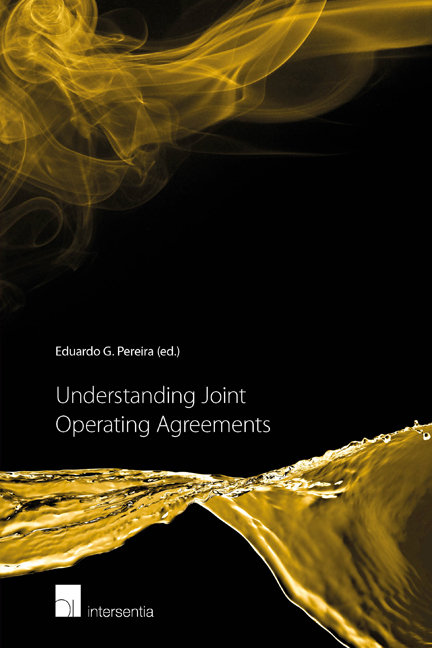Book contents
- Frontmatter
- Contents
- List of Abbreviations
- List of Authors
- Introduction
- PART I CONSIDERATIONS PRIOR TO ENTERING INTO A JOA
- PART II SETTING UP A JOA
- PART II.A GENERAL CONSIDERATIONS
- PART II.B CONTROL OF OPERATIONS AND EXPENDITURES
- 15 Authorising Work and Contracts: How is the North American System Unique?
- 16 Making the Default Mechanism Fair and Enforceable
- 17 The Relationship and Challenges between a Th ird Party Operator, the Joint Operating Company and JOA
- 18 Accounting Procedure: Can the Operator Make a Profit? How Can a Non-Operator Control the Costs of the Consortium?
- 19 Senior Supervisor, Financial Cap and Other Restrictions on the Operator's Liabilities and their Implications
19 - Senior Supervisor, Financial Cap and Other Restrictions on the Operator's Liabilities and their Implications
from PART II.B - CONTROL OF OPERATIONS AND EXPENDITURES
Published online by Cambridge University Press: 15 December 2017
- Frontmatter
- Contents
- List of Abbreviations
- List of Authors
- Introduction
- PART I CONSIDERATIONS PRIOR TO ENTERING INTO A JOA
- PART II SETTING UP A JOA
- PART II.A GENERAL CONSIDERATIONS
- PART II.B CONTROL OF OPERATIONS AND EXPENDITURES
- 15 Authorising Work and Contracts: How is the North American System Unique?
- 16 Making the Default Mechanism Fair and Enforceable
- 17 The Relationship and Challenges between a Th ird Party Operator, the Joint Operating Company and JOA
- 18 Accounting Procedure: Can the Operator Make a Profit? How Can a Non-Operator Control the Costs of the Consortium?
- 19 Senior Supervisor, Financial Cap and Other Restrictions on the Operator's Liabilities and their Implications
Summary
INTRODUCTION
The JOA entered into by the operator and non-operators always intends to manage the balance of the competing interests and obligations between all the participating parties to the joint petroleum operation. Historically, the oil and gas industry ‘ s perspective has been that operators should not be financially responsible to non-operators for the risk of conducting risky or significant operations unless the failure in such operation was caused by the gross negligence or wilful misconduct of the operator. In general, it seems there is a consensus among petroleum industry players that a JOA should include an exculpatory clause limiting the operator ‘ s liabilities, absent gross negligence or willful misconduct of the operator. The rationale for such notion is that the operator takes the risk in conducting the petroleum operation not for making any profit. Nevertheless, the ‘ no loss, no gain ‘ principle that applies to the operator during the performance of its duties is now seemingly being challenged by a number of factors, including stricter penalties for environmental damage, more pressure to comply with regulation, and increasing numbers of stakeholders involved in the process. Properly allocating liabilities between the operator and nonoperators is always the most difficult aspect of JOA negotiations. There are at least two reasons why negotiation of the operator ‘ s liabilities is so hard: firstly, all the participating parties understand that there are limited options for how liability/risk can be allocated between the operator and non-operators; secondly, the consequences of the allocation are so significant as to have the potential to lead to disastrously adverse damages.
As an in-house counsel often representing NOCs for JOA negotiations over the past ten years, the present author did not find the part of the process focusing on the negotiation of the operator ‘ s liabilities a pleasant experience. Especially in the post-Macondo world, it seems to be harder than ever to reach an agreement that is satisfactory to all the participants. Even before BP ‘ s oil spill accident in the Gulf of Mexico, it was not an easy task to negotiate a JOA if the participants were big oil companies.
- Type
- Chapter
- Information
- Understanding Joint Operating Agreements , pp. 373 - 386Publisher: IntersentiaPrint publication year: 2016



